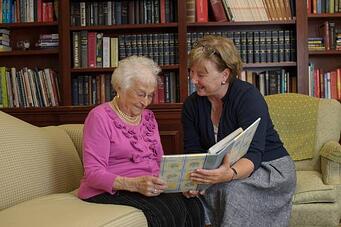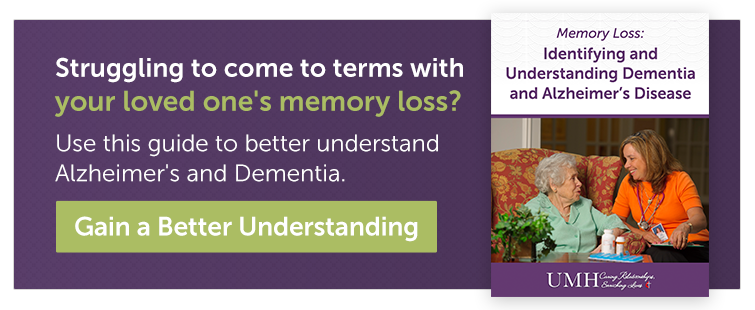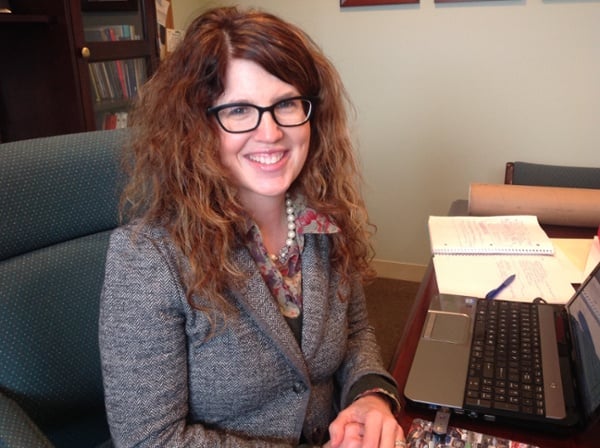 When a physician says: “Your mom is showing early signs of Alzheimer’s disease” your first reaction may be one of shock and anxiety. On the other hand, if he say’s “she has a little bit of dementia” you might feel a sense of relief thinking dementia comes with old age, and “at least she doesn’t have Alzheimer’s.”
When a physician says: “Your mom is showing early signs of Alzheimer’s disease” your first reaction may be one of shock and anxiety. On the other hand, if he say’s “she has a little bit of dementia” you might feel a sense of relief thinking dementia comes with old age, and “at least she doesn’t have Alzheimer’s.”
Dementia, Alzheimer’s (AD) or simply “old age?” What are the differences, and as a caregiver, do you really need to know? Are they all part of the same journey?
These terms are commonly confused. Misconceptions abound among family members, the media and even some healthcare providers. As a caregiver you want to know the differences that will help you adopt a senior caregiving plan best suited to the needs of your aging loved one.
Dementia Explained
Dementia is a symptom and not a disease. Depending on the cause of the symptom, it can be cured. Dementia is defined as “the loss of mental functions, such as thinking, memory and reasoning that is severe enough to interfere with a person’s daily functioning” (WebMd).
Dementia can be caused by alcohol abuse, hormonal imbalances, severe depression, medication or Alzheimer’s disease. Certain health conditions, such as thyroid problems, nutritional deficiencies, or urinary tract infections (UTI) can cause symptoms of dementia. It is important for family members to be proactive in working with healthcare providers to determine the true cause of any dementia symptoms; don’t automatically jump to conclusions.
Alzheimer’s versus Dementia
Alzheimer’s Disease is a disease of the brain that can trigger symptoms of dementia. In a nutshell, dementia is a symptom and Alzheimer’s may be the cause of it. Alzheimer’s disease, or AD, cannot be cured.
As people grow older, the prevalence of AD is seen much more. In assisted living communities, AD care is often a common part of the community’s service packages. Because Alzheimer’s causes up to 60% of all dementia cases, it is often used synonymously with the term dementia and wrongly believed to be a milder form of the disease, brought on by old age.

Old Age Explained
Although AD and dementia are pervasive in the older population, they are not normal conditions of aging. Old age is not a sickness or a health condition, but rather a mature stage of the human lifecycle—late adulthood— a gradual slowing down of “internal processes.” Even with this slowing down, your brain, if kept challenged, can remain active and sharp.
If caregivers can distinguish among AD, dementia and natural aging, they can become more proactive in pursuing diagnoses for loved ones and avoid missing potentially treatable conditions.
Key Takeaways:
- Misconceptions abound among family members, the media and even some healthcare providers about the differences between Alzheimer’s (AD), dementia and the process of aging.
- Dementia is a symptom and not a disease; depending on the cause of the symptoms, it may be cured.
- Alzheimer’s is a mental disease that can trigger symptoms of dementia. In a nutshell, dementia is a symptom and Alzheimer’s is the probable cause of the symptom.
- AD is common in later years, but it is not to be mistaken as a normal part of getting older.
- Old age is not a sickness or health condition, but rather a mature stage of the human lifecycle.
- If caregivers can distinguish among AD, dementia and natural aging, they can become more proactive in pursuing diagnoses for loved ones and avoid missing potentially treatable conditions.
Learn more about Dementia, Alzheimer's and Memory Care
Our Foxbridge Assisted Living and Memory Care Facility specialized in Alzheimer's care. If you would like to learn more please visit our website here.





 When a physician says: “Your mom is showing early signs of Alzheimer’s disease” your first reaction may be one of shock and anxiety. On the other hand, if he say’s “she has a little bit of dementia” you might feel a sense of relief thinking dementia comes with old age, and “at least she doesn’t have Alzheimer’s.”
When a physician says: “Your mom is showing early signs of Alzheimer’s disease” your first reaction may be one of shock and anxiety. On the other hand, if he say’s “she has a little bit of dementia” you might feel a sense of relief thinking dementia comes with old age, and “at least she doesn’t have Alzheimer’s.”